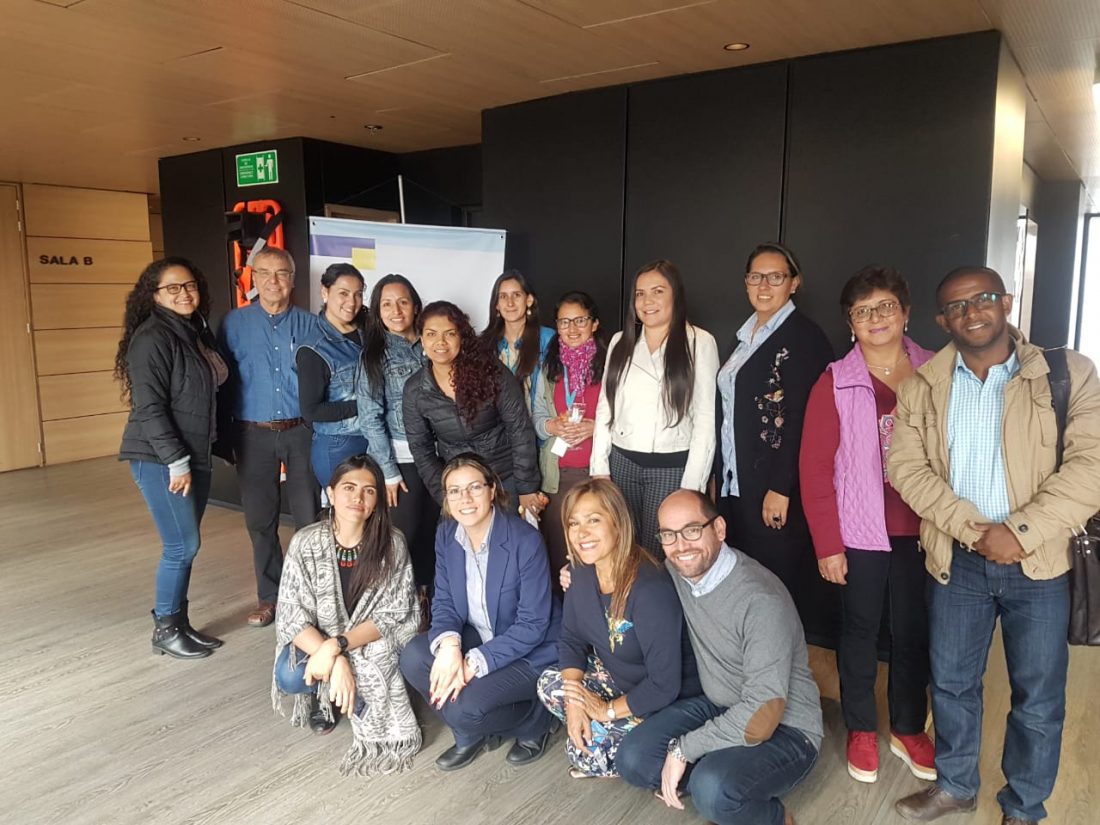
PAGEL-CAPAZ Project ends its first mental health workshop with the Bogota Health Department

Group of assistants of the Bogota Health Department and facilitators of the PAGEL-CAPAZ project
The PAGEL-CAPAZ Project public-health component: “Improvement of the mental health of populations displaced to Colombia’s urban areas”, ended on August 29 at Pontificia Universidad Javeriana with a workshop to strengthen the skills of the civil servants at Bogota Health Department. The workshop aimed to improve the management of mental health programs for victims of the armed conflict and it targeted mental health personnel in charge of the Psychosocial and Integral Healthcare for Victims Programme (PAPSIVI) of Bogota’s health service subnets.
The workshop specifically aimed to learn how to use epidemiological and management tools in the context of a health program for victims and the displaced, prioritising mental health problems and health services according to resource optimisation criteria; to strengthen the work of interdisciplinary teams that formulate and implement projects in this area; and to monitor and evaluate the problems identified relating to the formulation of mental health plans.
For three days, officials at the Bogota Health Department and health service subnets shared their knowledge with the researchers and facilitators at the Centre for Medicine and Society (ZMG) at the University of Freiburg, (Dr. Sonia Díaz Monsalve and Prof. Dr. Axel Kroeger) and the Public Health Institute at Pontificia Universidad Javeriana (Dr. Andrés Cubillos, Angélica Vargas and Yesika Fernández).

Session on analysis of associated factors to mental health problems
Epidemiological tools were used to identify, quantify, analyse and formulate mental healthcare activities. The tools are structured to involve epidemiological issues that were fundamental for the workshop; these include: which health problems, how these can be quantified (the use of Health rates and indicators), when they occur (temporal variation), where they occur (geographical variation), who participates (risk focus), and why do they occur (associated factors and causal relationships).
To prioritise mental health problems, emphasis was placed on the need to consider the demands and requirements of the affected populations, as well as the cost of a possible intervention. Epidemiological planning tools were applied (e.g.: endemic curve, risk maps) that allowed the spatiotemporal comparison of the behaviour of the data on the mental health phenomena observed.
Special attention was placed on the methodology to identify causal relationships among the problems that emerged in the different cases analysed. Problems such as the population’s reduced access to mental health services in Colombia and the shortcomings in the fulfilment of the legislation established in this sector -selected as priority by the workshop participants- were analysed using “problem trees”, a methodological tool typical of the logical framework approach.

From left to right: Prof. Dr. Axel Kroeger, Dr. Sonia Díaz Monsalve, Dr. Carlos Nupia (CAPAZ), Angélica Vargas and Dr. Andrés Cubillos
On the last day of the workshop, the participants identified a set of priority topics that they wanted to continue working on in a second workshop that will take place in December 2018 in Bogotá. Activities pertaining to the project’s public-health component will end in March or April 2019, and the training program will end with a knowledge consolidation phase, implemented into a summer course to take place in August 2019 in Freiburg (Germany). Mental health groups previously trained within the context of this program from the Department of Guajira and Cesar will take part in the course.
For further information on the PAGEL-CAPAZ Project public health component, please contact:
Dr. Andrés Cubilllos. Assistant Professor . Instituto de Salud Pública. Pontificia Universidad Javeriana: cubillos.a@javeriana.edu.co
Dr. Sonia Díaz Monsalve. Coordinator of the Centre for Medicine and Society (ZMG). University of Freiburg. sonia.diaz.monsalve@zmg.uni-freiburg.de
Related sources:
Master of Science in Global Urban Health (M.Sc. GUH)
University of Freiburg
School of Humanities
Centre for Medicine and Society (ZMG)
https://www.zmg.uni-freiburg.de/en/training/mscglobalhealth
Instituto de Salud Pública
Pontificia Universidad Javeriana
http://www.javeriana.edu.co/ins-salud-publica



